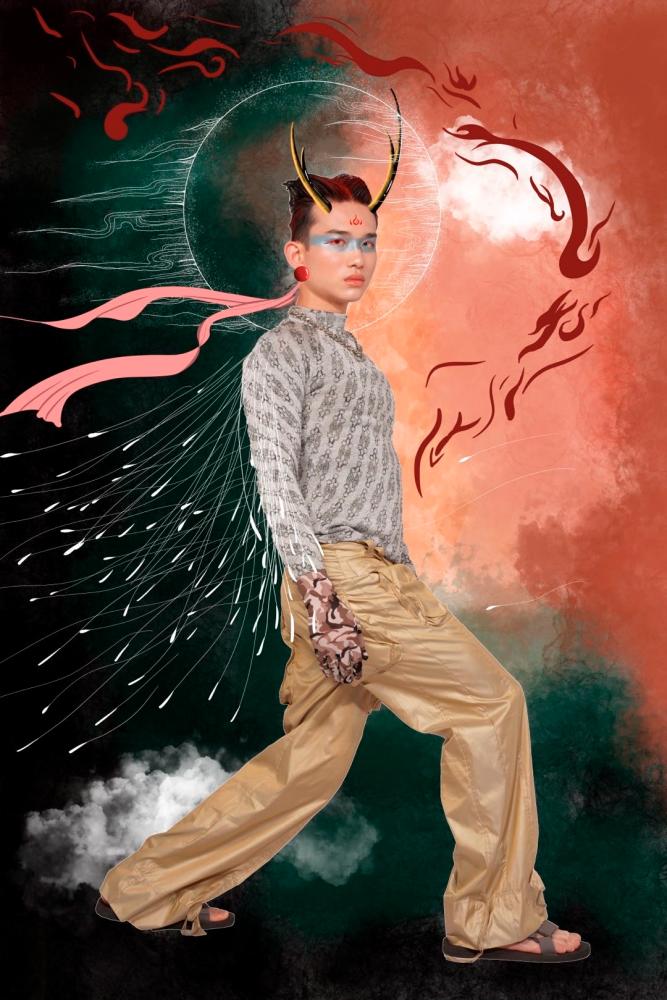MALAYSIAN-BORN, Sweden-based singer-songwriter Kit Naga says: “It’s such a cliche when people say that music saved their life, but that’s my reality. Nothing I did made me feel better, aside from creating music.”
He shares: “When I was 17, I started writing down my feelings and thoughts through poems, and sometimes even essays. And I found an immense love for music and its ability to take me to another world, where I can get in touch with my emotions and cope with my anxiety and unhappiness.”
To take his mind off distressing sorrows, writing became his method for invigorating his struggle with his true self against prevailing insecurities.
After graduating from university, the 25-year-old shifted his focus to music, and Kit Naga was born. His distinctly soulful and emotional sound with pop distortion paints a whimsical landscape drenched in joyful fantasy, in which his past and present coalesce.

What are some of your earlier artistic influences?
“I grew up listening to Chinese songs, I was a big fan of Jay Chou. And one day I was listening to an English top hits CD in the car and it became a huge game-changer for me. It forever changed what music came to mean for me, I didn’t know music could be so diverse and fun.
“In high school, I was very involved in the drama club. I spent most of my time acting, writing, and organising activities. I even participated in a musical theatre production, where we designed costumes and built stage props and backdrops from scratch, it was the starting point where I familiarised myself with different personas, stories and concepts, and later showcased that through my music.”
You were based in Melbourne previously, and now live in Sweden. How important are locations and cultures as influences on music?
“Moving to Melbourne when I was 18 was probably the best decision I ever made. Although it was difficult to adapt in the beginning, it was the first time that I felt free and that I could live openly.
“My time in Melbourne really taught me to love myself and be confident. Musically, Sweden has a lot to offer, some of the best current producers are from Sweden. I really enjoy their upbeat songs wrapped up in melancholic lyrics and hopeful melodies.”
Why do you write?
“I like writing about my experiences and stories through melodies and lyrics that resonate with people. I hope to inspire people the way I was inspired. I want people to know that it’s okay to push boundaries and do the unexpected.
“We all have experienced people ostracising others when they don’t fit their standards, I want to change that and create a world that is less judgemental and celebrates uniqueness.”
Tell us more about your writing style.
“Sometimes I write my lyrics first and then the melodies, sometimes the other way around. There really isn’t one way in how I write my songs.
“Whenever an idea pops up in my head, I stop and write it down, even if I’m out on the street. Those ideas could be phrases or hooks that could potentially be used in my music. Same goes with melodies. I’ve saved all my ideas in my notes and voice memos.”

You entered the music industry in September 2019 with your debut single Babe.
“It’s about my long-distance relationship at the time; I felt as though my partner wasn’t there and that I had no freedom.
“The song is about having mutual trust in a relationship. In the lyrics I wrote: “I still love you very much, so please just let me be happy and I will forever be your baby. If you let me be me, I will let you be you.”
“However, in the music video, the story is portrayed as an unconditional love story between a father and his son. I don’t like it when things are too obvious.”
Talk to us about the idea behind your debut album Son of the Dragon.
“My name Kit is a part of my Chinese name, and Naga, the Malay word for dragon, pays homage to my Chinese-Malaysian heritage and my fascination with mythology.
“I’ve always been drawn to shows like Journey to the West and Gods of Honour. In Chinese mythology, there’s this saying that people are the descendants of dragons, hence, I want to retell these stories and culture in my own way through my music.
“Son of the Dragon is about a boy who never felt good enough but now he’s soaring out of his shell. It’s an emotionally rich and textured album, with each track telling a personal story: School talks about my high school experiences, Colours is about my identity, Sheep is about the struggles I had growing up.”
In the increasingly saturated music industry with an overwhelming pool of talents, what are some of the hurdles you’re facing?
“As an independent artiste, I have fewer resources than artistes who are signed to record labels. I’m trying to achieve my visual fantasies with the smallest budget possible. I’m slowly learning how to do all that by myself, while staying true to who I am.
“Coming back to Malaysia recently, I hope to collaborate with local producers to release some new bangers that I’ve written in the last few months in Sweden. Although Sweden never had a lockdown, I was still too anxious to go outside, so I spent a lot of time indoors writing new songs.”















